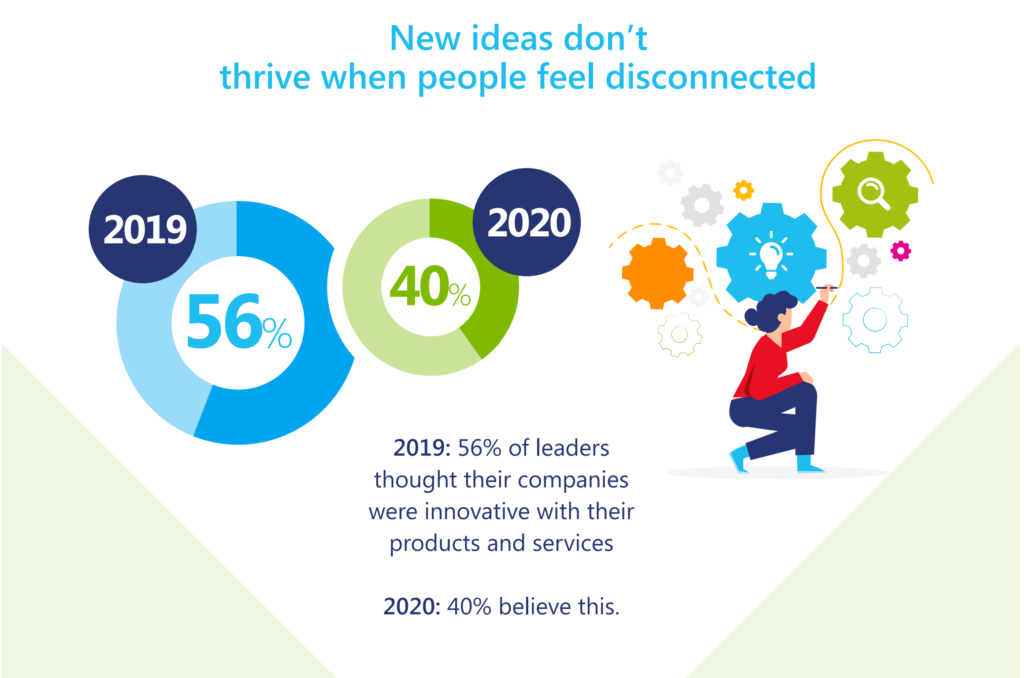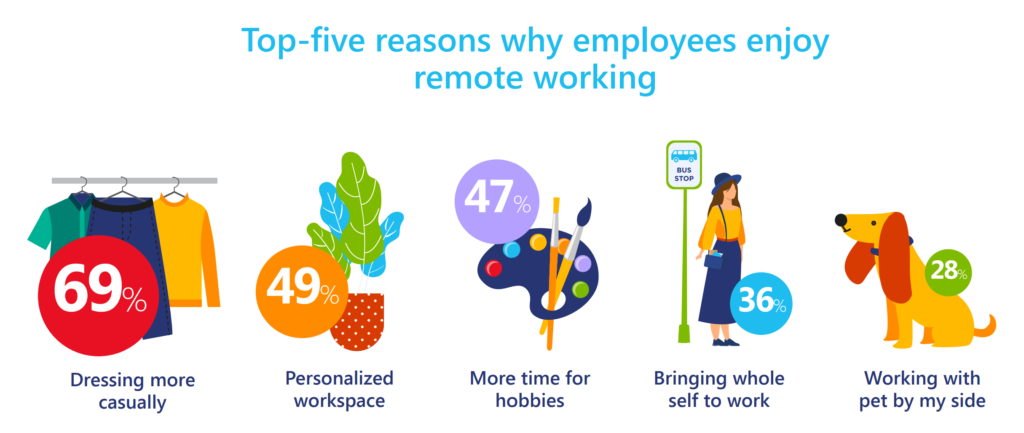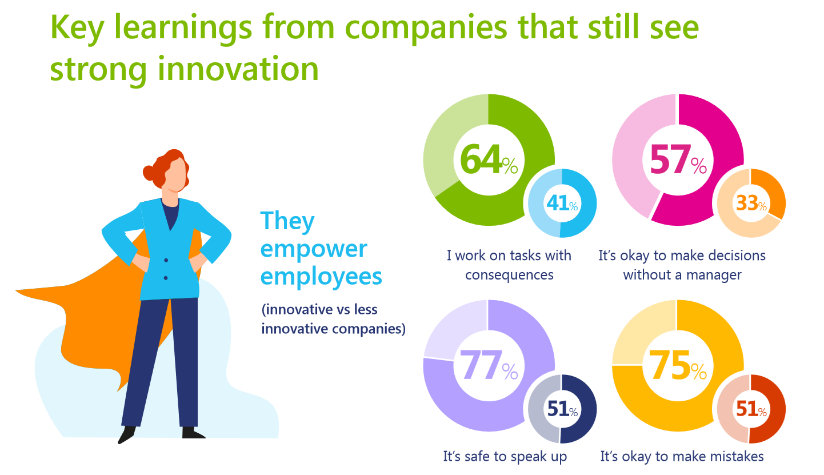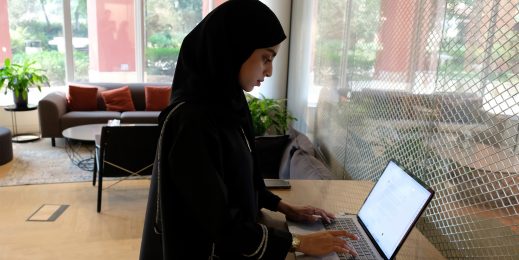
Flexible ways of working are here to stay, finds new European research – with leaders focused on maintaining culture and innovation
 Since the beginning of the Industrial Age, Europe’s workforce has been largely rooted in a predicable rhythm of business – a workday that consists of clocking in at 9, clocking out at 5 and two hectic commutes on either side. Covid-19 has turned that centuries-old model on its head.
Since the beginning of the Industrial Age, Europe’s workforce has been largely rooted in a predicable rhythm of business – a workday that consists of clocking in at 9, clocking out at 5 and two hectic commutes on either side. Covid-19 has turned that centuries-old model on its head.
Wanting to help our customers navigate this uncertain time and best support their employees, we commissioned research with Boston Consulting Group and KRC Research. Engaging with thousands of workers and leaders across Europe, we asked people about their experiences with remote working as well as about their expectations for the future.
The key finding? We all want a more innovative and flexible way of working. However, while maintaining productivity hasn’t been an issue with remote working – a strain on team culture seems to be hampering innovation.
People don’t want to wear a suit anymore
One of the clearest findings from the report is the liberation people are feeling from being free of office etiquette. We like dressing down, personalizing our workspaces, and yes, we want our dog or cat sat next to us when we work.
Leaders also expect a different way of working for the foreseeable future. Last year, only a small minority (15%) of companies had a set remote work policy. That number is now a healthy majority (76%). This is an incredible increase, but it is not without reason. Senior executives have seen that remote teams can be highly productive, with 82% saying they saw productivity levels either hold steady or increase as people shifted to remote work. Many senior execs also see hybrid working as a way to boost employee engagement, with over half saying it will be a powerful way to retain top talent.
However… promoting innovation is proving harder than ensuring productivity
While business continuity and productivity have broadly remained unchanged, business leaders are reporting a decrease in innovation around core products and services.
Why?
One likely cause is that workers report feeling more distant from company culture, less close-knit to teams and less collaborative.
“It seems that employees are able to hunker down and get less distracted while working remotely, and they can even enjoy less or no commute times, dressing casually (less time to get ready for work), and take better care of home chores. However, the cost seems to be a loss of sense of purpose, which at work, is largely driven through strong and cohesive relationships and seeing how your tasks have impact on others. Both of these are more easily accomplished when people work co-located and are more challenging when working virtually.”
Dr. Michael Parke, The Wharton School of University of the Pennsylvania and research collaborator
 When people are physically together five days a week, it’s easy to bond – whether it’s sharing a joke at the watercooler, having a casual team lunch, or hunkering down together to meet a deadline. Further, in an office setting, senior staff literally have the ability to “walk the halls” and talk with employees in a more informal way. All of these seemingly little things add up to have a big impact on the health of a business and team culture.
When people are physically together five days a week, it’s easy to bond – whether it’s sharing a joke at the watercooler, having a casual team lunch, or hunkering down together to meet a deadline. Further, in an office setting, senior staff literally have the ability to “walk the halls” and talk with employees in a more informal way. All of these seemingly little things add up to have a big impact on the health of a business and team culture.
It’s only logical to expect to see a drop in innovation, as it’s hard for new ideas to thrive in an environment where people feel more disconnected from their employer and their teams.
So how can leaders drive productivity and innovation in a hybrid world?
In looking at companies that have maintained both productivity and innovation throughout the move to more hybrid ways of working, there are key learnings for all companies.
Employees at companies that are excelling in terms of both productivity levels and maintaining innovation output report a very different work experience to their peers at businesses that only do well in productivity.
These workers are far more likely to feel empowered to make decisions and approach their jobs in a way that works best for them.
The most successful businesses protect employees’ focus. The term ‘flow state’ has become more popular in recent years, and for good reason. It describes when a person is able to devote their full attention to the task at hand. The total immersion in the working experience leads to superior output.
One straightforward step to take to help people stay in a flow state is to ensure they have proper training on tools like Microsoft Teams, and are availing of features like ‘do not disturb’. This helps people take control of their day and make time for the work that takes focus.
Support managers
For many team managers, this year marked the first time they were responsible for leading people who were working remotely. Unsurprisingly, the majority said they feel they have not yet effectively learned how to delegate and empower virtual teams.
To provide the best possible support for employees, it’s essential that managers are equipped with the skills they need in this new hybrid world. Successfully maximizing the potential of a remote or hybrid team requires a different skill set, not only in terms of ensuring core business objectives are met, but also that new ideas are encouraged, cultivated and implemented. As such, revisiting training programs for team leaders will be an important step forward for many businesses.
And of course, the past several months have been extremely challenging for all senior business leaders as they’ve coped with maintaining business continuity while keeping workers safe. As such, it’s not altogether surprising that less than half of managers say they feel they are getting the support they need from senior staff. This suggests there may also be an opportunity for many businesses to reinitiate or ramp up ongoing coaching and mentoring for middle management.
“For many businesses, their normal day-to-day reality has been based in a traditional office setting. So…it’s hard for many workers to quickly adapt to a new way of remote working. This includes managers and leaders who face the challenge of not only making sure core business objectives are met in times of increased uncertainty, but also ensuring their teams stay cohesive and engaged during a stressful time.”
Sarah Fisher, General Manager, Human Resources, Microsoft EMEA
The key takeaway from all of this is that the success of teamwork in a more hybrid world goes beyond just having the right technology tools. Innovation is fueled when people feel empowered to connect with colleagues, take smart risks and speak up when they have new ideas.
So, the challenge for businesses will be ensuring people feel connected to their teammates and to clearly see how the work they do as a team contributes to realizing the vision of the company. Successful teams will be characterized by how productive they are as well as the sense of comradery, empathy and trust each team member feels.
This, is the very human key to innovation.
Microsoft commissioned research across 15 European markets in August 2020. The online survey was designed and conducted by KRC Research in partnership with Boston Consulting Group and supervised by Dr. Michael Parke, professor at The Wharton School of the University of Pennsylvania. KRC polled approximately 9,000 managers and employees from large (250+ staff) businesses, with an average sample size of 600 respondents per country (500 employees and 100 managers). Respondents were not informed that Microsoft commissioned the survey.


















